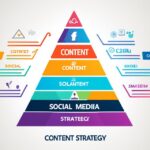Table of Contents
A B2B content strategy is a crucial component of any successful marketing plan. It helps businesses communicate effectively with their target audience, enhance brand awareness, and achieve their business goals. By developing a well-defined content marketing strategy, businesses can create engaging content, drive customer engagement, and build lasting relationships.
In this article, we will explore the key elements of a B2B content marketing strategy, the benefits it offers, and the steps to develop an effective strategy. We will also uncover the secrets to a successful B2B content marketing strategy, providing you with valuable insights and actionable tips.
So, whether you are just starting with B2B marketing or looking to improve your existing strategy, this article will guide you towards building a content strategy that resonates with your target audience, drives results, and elevates your marketing efforts.
But before diving into the details, let’s take a moment to understand what exactly a B2B content strategy is and why it is crucial for effective business communication.
What is a B2B Content Marketing Strategy?
A B2B content marketing strategy is a well-thought-out plan that guides businesses in creating, distributing, and utilizing content to engage and attract their target audience. It is more than just sporadic content creation; it encompasses a strategic approach to building brand awareness, driving customer engagement, and achieving business goals.
A well-defined content marketing strategy serves as a roadmap for businesses, helping them determine what types of content to create, where to publish it, and how to measure its success. It involves the creation of various content formats such as blog posts, videos, case studies, eBooks, webinars, and social media content, all tailored to resonate with the target audience.
“A B2B content marketing strategy is a well-thought-out plan that guides businesses in creating, distributing, and utilizing content to engage and attract their target audience.”
Building Brand Awareness and Driving Customer Engagement
One of the primary objectives of a B2B content marketing strategy is to build brand awareness. By delivering valuable and relevant content to their target audience, businesses can increase their visibility and establish themselves as authoritative figures in their industry.
Through consistent and strategic content creation, businesses can actively engage their target audience and foster a sense of community. This engagement not only strengthens the bond between the brand and its customers but also allows businesses to gather valuable insights and feedback to further refine their marketing efforts.
Measuring Success and Achieving Business Goals
A key component of a B2B content marketing strategy is the ability to measure its success. By utilizing metrics and analytics, businesses can track their content’s performance and gain insights into what works and what doesn’t. This data-driven approach enables businesses to make informed decisions and optimize their content marketing efforts to achieve their specific business goals.
Whether the goal is to generate leads, increase website traffic, or drive conversions, an effective content marketing strategy provides businesses with the tools and methodologies to track their progress and adapt their strategies accordingly.
| Target Audience | Brand Awareness | |
|---|---|---|
| Definition | The specific group of individuals or businesses that a company aims to reach and engage with through their content | The level of recognition and familiarity that a brand has among its target audience |
| Importance | Understanding the target audience is crucial for creating relevant and impactful content | Building brand awareness helps establish the brand’s reputation and trustworthiness |
| Approach | Market research and data analysis are used to identify the target audience’s needs and preferences | Strategic content creation, consistent delivery, and active promotion are employed to increase brand visibility |
| Result | Content that resonates with the target audience, leading to higher engagement and conversions | A recognized brand that is top-of-mind for the target audience, enhancing credibility and attracting new customers |
By focusing on their target audience and building brand awareness, businesses can leverage a B2B content marketing strategy to effectively engage their customers and achieve their business goals.
Benefits of Having a B2B Content Marketing Strategy
A B2B content marketing strategy offers numerous benefits to businesses. By implementing a strategic approach to content creation and distribution, companies can achieve various marketing objectives and drive business growth. Let’s explore the key advantages of having a B2B content marketing strategy:
1. Increased Brand Awareness and Reach
A well-executed B2B content marketing strategy helps businesses expand their brand’s visibility and reach a larger audience. By consistently delivering valuable content that resonates with their target customers, companies can build brand awareness and establish themselves as industry leaders.
2. Improved Audience Engagement
Engaging content plays a crucial role in building strong connections with the target audience. A B2B content marketing strategy enables businesses to create compelling and relevant content that captivates their audience’s attention and encourages active participation. By fostering meaningful interactions with their customers, companies can strengthen their relationships and drive customer loyalty.
3. Enhanced Customer Trust and Credibility
When businesses consistently produce high-quality and informative content, they establish themselves as trusted authorities in their respective industries. A B2B content marketing strategy allows companies to showcase their expertise, educate their audience, and gain their customers’ trust. By positioning themselves as credible sources of information, businesses can influence purchasing decisions and differentiate themselves from competitors.
4. Increased Website Traffic
A well-crafted B2B content marketing strategy drives targeted traffic to a company’s website. By optimizing content for search engines and promoting it across various channels, businesses can attract organic traffic and increase their website’s visibility. With more visitors accessing their website, companies have a higher chance of generating leads and converting them into customers.
5. Higher Conversion Rates
A strategic content marketing approach guides potential customers through the sales funnel, resulting in higher conversion rates. By delivering relevant and valuable content at each stage of the buyer’s journey, businesses can nurture leads and move them closer to making a purchase. A B2B content marketing strategy ensures that the right content is delivered to the right audience at the right time, maximizing the chances of conversion.
Having a B2B content marketing strategy provides businesses with a range of benefits, including increased brand awareness, improved audience engagement, enhanced customer trust, increased website traffic, and higher conversion rates. By strategically creating and distributing content, companies can establish themselves as industry leaders, drive customer loyalty, and achieve their marketing objectives.
Elements of a Successful B2B Content Marketing Strategy
Successful B2B content marketing strategies involve knowing the target audience and their pain points. They also include targeting potential customers directly, generating leads cost-effectively, and maximizing the reach and revenue-generating capabilities of each piece of content. Top performers attribute their success to knowing their audience and other factors such as distribution channels, content formats, and data-driven decision making.
-
Understanding the Target Audience
In order to create a successful B2B content marketing strategy, it is crucial to have a deep understanding of the target audience. This includes researching their demographics, preferences, challenges, and goals. By knowing exactly who you are targeting, you can tailor your content to resonate with their needs and provide valuable solutions.
-
Targeting Potential Customers Directly
Instead of having a generalized approach, top performers in B2B content marketing focus on targeting potential customers directly. They use personalized messaging, account-based marketing, and other strategies to engage specific companies or individuals. This targeted approach helps to build stronger relationships and increases the chances of conversion.
-
Generating Leads Cost-Effectively
A successful B2B content marketing strategy also involves generating leads in a cost-effective manner. This can be achieved through various tactics such as creating high-value gated content, optimizing lead capture forms, and implementing lead nurturing campaigns. By maximizing the return on investment for lead generation efforts, businesses can drive growth without overspending.
-
Maximizing Reach and Revenue-Generating Capabilities
Top performers understand the importance of maximizing the reach and revenue-generating capabilities of each piece of content. They do this by repurposing content across multiple channels, leveraging social media platforms, and incorporating SEO best practices. By maximizing the visibility and impact of their content, businesses can attract a larger audience and drive more revenue.
Having a comprehensive understanding of the target audience, targeting potential customers directly, generating leads cost-effectively, and maximizing the reach and revenue-generating capabilities of content are key elements of a successful B2B content marketing strategy. By implementing these strategies, businesses can effectively engage their target audience and achieve their marketing goals.
Steps to Develop a B2B Content Marketing Strategy
Developing a B2B content marketing strategy involves several key steps that help businesses engage their target audience, choose effective content formats and channels, and optimize their strategy for SEO best practices. By following these steps, businesses can create a well-rounded content marketing plan that drives results and achieves their marketing goals.
1. Understand Your Target Audience
Before embarking on a B2B content marketing strategy, it is crucial to have a deep understanding of your target audience. Research their demographics, pain points, and preferences to create content that resonates with them. This will ensure that your content is tailored to their needs and interests, making it more likely to engage and convert them into customers.
2. Choose Core Content Formats and Channels
Once you know your target audience, select the core content formats and channels that align with their preferences and behavior. Consider a mix of content formats such as blog posts, videos, case studies, webinars, and infographics to cater to different audience preferences. Determine the channels where your target audience is most active, such as social media platforms, industry forums, or email newsletters, and focus your content distribution efforts accordingly.
3. Come Up with Relevant Topics
Generating relevant and compelling topics is essential for a successful B2B content marketing strategy. Conduct keyword research to identify the topics that your target audience is actively searching for, and brainstorm ideas that address their pain points or provide valuable insights. Ensure that your topics align with your brand’s expertise and positioning, establishing your authority in the industry.
4. Systematize the Content Process
To maintain consistency and efficiency in your content creation, develop a process that includes content planning, creation, editing, and publishing. Establish an editorial calendar with clear deadlines and assign responsibilities to each team member involved. Implement a content management system or project management tool to streamline collaboration and ensure smooth workflow management.
5. Promote the Content Effectively
Great content alone is not enough; it needs to be effectively promoted to reach your target audience. Develop a promotion plan that includes social media posting, email outreach to industry influencers or partners, and collaboration with relevant publications or websites. Leverage your existing channels and networks to amplify the reach of your content and encourage sharing.
6. Optimize for SEO Best Practices
SEO best practices are crucial for increasing the visibility and discoverability of your content. Conduct keyword research to identify relevant keywords and incorporate them naturally into your content. Optimize meta tags, headings, and image alt tags to improve your content’s ranking in search engine results. Ensure that your content is mobile-friendly, loads quickly, and follows other technical SEO guidelines.
7. Measure the Success Through Key Performance Indicators
Regularly monitor and analyze the performance of your B2B content marketing strategy using key performance indicators (KPIs) such as website traffic, conversions, engagement metrics, and social media reach. Use analytics tools to track metrics and make data-driven decisions to optimize your strategy over time. Regularly review and refine your content strategy based on the insights gained from your performance data.
By following these steps and continually refining your B2B content marketing strategy, you can effectively engage your target audience, drive relevant traffic, and achieve your marketing goals.
Secrets to Successful B2B Content Marketing Strategy
The secret to a successful B2B content marketing strategy lies in creating concise, engaging content that provides value to the audience. By tailoring the content to the target audience’s needs, businesses can capture their attention and keep them coming back for more. Utilizing real numbers and testimonials adds credibility to the content and increases trust in the brand. Incorporating storytelling, humor, and creativity helps to make the content memorable and shareable, amplifying its reach.
Building a content ecosystem with different types of media further enhances the strategy’s effectiveness. This could include blog posts, videos, podcasts, infographics, and more. By leveraging various content formats, businesses can cater to different preferences and deliver a more engaging experience. Additionally, maintaining authenticity throughout the content is crucial. This means staying true to the brand’s voice, values, and purpose, and avoiding overly promotional or sales-focused content.
Authenticity creates a genuine connection with the audience, fostering trust and loyalty. It gives businesses a unique edge in a crowded marketplace and sets them apart as industry thought leaders. When people perceive the content as authentic, they are more likely to engage with it, share it with others, and ultimately convert into customers.
Creating content that is both engaging and authentic requires a deep understanding of the target audience, their pain points, and what resonates with them. It involves continuous research, testing, and optimization to ensure the content remains relevant and impactful. By consistently delivering valuable content, businesses can build long-lasting relationships with their audience, establish themselves as trustworthy authorities, and drive meaningful business results.
Conclusion
Building a content strategy for B2B marketing is vital to ensuring effective business communication. With a well-defined B2B content marketing strategy, businesses can engage and attract their target audience, build brand awareness, drive customer engagement, and ultimately achieve their business goals. By understanding their target audience’s needs and preferences, creating valuable and relevant content, utilizing various content formats and channels, and measuring the success of their marketing efforts, businesses can enhance their overall marketing strategy and communicate effectively with their audience.
A well-crafted B2B content marketing strategy allows businesses to establish a strong online presence and connect with their target customers on a deeper level. By delivering valuable and informative content, businesses can establish themselves as industry thought leaders and gain the trust and credibility of their audience. Additionally, utilizing different content formats such as blog posts, case studies, videos, and webinars allows businesses to cater to different learning styles and engage their audience more effectively.
Furthermore, implementing search engine optimization (SEO) best practices ensures that businesses’ content is easily discoverable and ranks higher in search engine results. This, in turn, drives organic traffic to their website and increases their chances of reaching and converting potential customers. By regularly monitoring and analyzing key performance indicators (KPIs) such as website traffic, engagement metrics, and lead conversions, businesses can measure the effectiveness of their content marketing efforts and make data-driven decisions for continuous improvement.
FAQ
What is a B2B content marketing strategy?
A B2B content marketing strategy is a carefully crafted plan that outlines how businesses will create, distribute, and utilize content to engage and attract their target audience.
What are the benefits of having a B2B content marketing strategy?
Having a B2B content marketing strategy offers numerous benefits, including increasing brand awareness, improving audience engagement, enhancing customer trust and credibility, increasing website traffic, and attracting leads for higher conversions.
What are the elements of a successful B2B content marketing strategy?
The elements of a successful B2B content marketing strategy include knowing the target audience and their pain points, targeting potential customers directly, generating leads cost-effectively, maximizing the reach and revenue-generating capabilities of each piece of content, and making data-driven decisions.
What are the steps to develop a B2B content marketing strategy?
The steps to develop a B2B content marketing strategy include understanding the target audience, picking core content formats and channels, coming up with relevant topics, systematizing the content process, promoting the content effectively, using SEO best practices, and measuring the success of the strategy through key performance indicators.
What are the secrets to a successful B2B content marketing strategy?
The secrets to a successful B2B content marketing strategy include creating concise, engaging content that provides value to the audience, tailoring the content to the target audience’s needs, using real numbers and testimonials, incorporating storytelling, humor, and creativity, building a content ecosystem with different types of media, and maintaining authenticity.
How does a B2B content marketing strategy help with business communication?
Building a content strategy for B2B marketing is essential for effective business communication. A well-defined strategy helps businesses engage and attract their target audience, build brand awareness, drive customer engagement, and achieve business goals.













